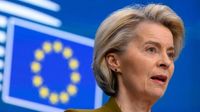The European Union is set to unveil a new crisis preparedness strategy that highlights the necessity for citizens to be ready for various emergencies, including potential wars, pandemics, and climate disasters. This strategy, termed the Union Preparation Strategy, emphasizes self-sufficiency for a minimum of 72 hours for every household.
Scheduled for presentation on March 26, 2025, the strategy stems from an increasing global landscape marked by tensions and unpredictable threats. President of the European Commission, Ursula von der Leyen, recently underscored the importance of the initiative, stating, "We must prepare for incidents and large-scale intersectoral crises, including the possibility of armed aggression that affect one or more member states," according to a draft document sourced by El País.
With heightened unease regarding aggressions by nations like Russia, the EU's strategy outlines that European households should stockpile essential provisions, including water, medicines, batteries, and food. The aim is simple but profound: residents must be self-sufficient for at least three days during emergent situations. This call for readiness has never been more pertinent, as the Commission warns, "In the context of increasing natural and anthropogenic risks, and deteriorating security prospects for Europe, it is urgent that the EU and its member states strengthen their preparation." The initial hours of any disruption often prove to be the most critical.
The Union Preparation Strategy outlines a comprehensive approach involving 30 key actions designed to bolster the collective resilience of EU nations. These actions range from civilian emergency preparedness efforts to more technical initiatives, such as joint military maneuvers and specialized training courses aimed at equipping both youths and adults.
Moreover, the strategy emphasizes the EU's obligation to deploy every available resource in support of its member states during crises. "This could include military resources made available by countries," the draft specifies, suggesting a significant shift toward proactive military readiness within the EU framework.
As part of a broader strategy, the Union Preparation Strategy also proposes creating a digital platform that would furnish citizens with vital information during crises, including potential shelters and other resources. This information network aligns with the goal of ensuring that Europeans are not only prepared but informed, fostering a culture of awareness about the various risks they may face.
Polish Minister Radosław Sikorski recently sounded the alarm over possible Russian aggression, noting, "Russia cannot yet defeat Ukraine on its own, but if it utilizes the full industrial capacity of Ukraine, the power balance would shift." He emphasized the need for readiness against such threats, echoing sentiments similar to those expressed by the European Commission.
Interestingly, as part of individual country initiatives, both Sweden and Finland have also taken practical steps to encourage their citizens to prepare for emergencies. The Swedish government has distributed guidelines on acting during crises, providing clear steps on how to respond to potential conflicts, from ensuring adequate food stores to procedures for air raid shelters.
This proactive approach from EU members shows a significant shift in mindset within Europe. The current geopolitical climate demands a comprehensive reevaluation of how each nation within the union prepares for unforeseen circumstances. It is a recognition that the security umbrella of traditional allies, particularly the United States, may no longer be as reliable as before.
While the EU's larger rearmament discussions include plans to mobilize significant funding for defense improvements—upwards of €800 billion as discussed—this new strategy also emphasizes a grassroots approach, focused on individuals and families across the continent. The European Commission aims to ensure homes are stocked and citizens are trained to respond effectively to crises.
As climate change continues to wreak havoc globally, especially within the most vulnerable areas of southern Europe, the strategy advocates for preparedness against natural disasters as well. As the Commission notes, "The initial period is the most critical in extreme disruptions," a reminder that proactive measures can save lives.
In conclusion, the EU's Union Preparation Strategy represents an ambitious but necessary shift in how Europe prepares for multifaceted threats. By placing an emphasis on resilience, civil cooperation, and immediate self-sufficiency, this new strategic direction invites every European family to play an active role in safeguarding their communities. The focus on practical preparedness through community action and resource stockpiling aims to position Europe as a united, resilient entity in the face of global uncertainties.








